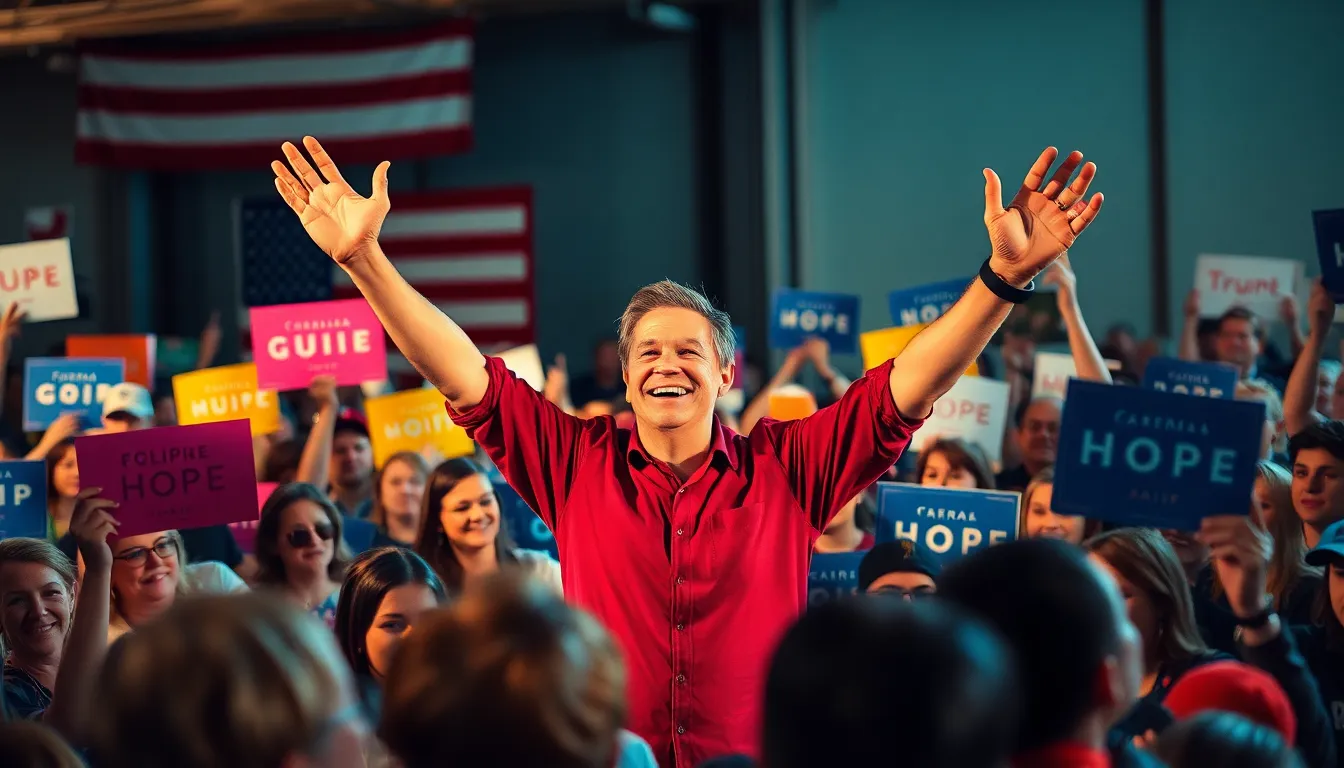In the rollercoaster world of politics, endorsements are the confetti that can make or break a campaign. Imagine a candidate strutting down the campaign trail, and suddenly, a beloved celebrity or respected figure jumps in with a glowing endorsement. It’s like adding a turbo boost to a car that was already zooming ahead. These endorsements not only lend credibility but also sway public opinion in ways that can leave even the most seasoned political analysts scratching their heads.
But why do endorsements matter so much? They’re not just a popularity contest; they’re strategic moves that can shape narratives and influence voter behavior. With the right backing, candidates can turn their political dreams into reality, while voters gain a sense of trust and assurance. Dive into the fascinating world of political endorsements and discover how they can transform the landscape of elections, one shout-out at a time.
Table of Contents
ToggleUnderstanding Political Endorsements
Political endorsements play a critical role in shaping electoral outcomes. They signal support from influential figures, enhancing a candidate’s visibility and credibility.
Definition of Political Endorsements
Political endorsements refer to public declarations of support for a candidate or party from individuals or organizations. These endorsements signal trust and approval, providing reassurance to voters. Endorsements can originate from various sources, such as political leaders, community organizations, or prominent figures in society. Their primary purpose involves influencing public opinion and swaying undecided voters during elections.
Types of Political Endorsements
Various types of political endorsements exist, each with unique impacts. Candidate endorsements occur when respected individuals, such as former leaders or political allies, publicly support a candidate. Party endorsements happen when political parties back specific candidates, lending organizational resources and strategic advantages. Interest group endorsements arise from organizations advocating specific issues, showcasing alignment between the candidate’s platform and the group’s goals. Celebrity endorsements leverage fame to garner attention and connect with diverse voter demographics. Each type plays a significant role in rallying support and promoting candidates effectively.
The Influence of Endorsements

Endorsements significantly shape the political landscape. They create a framework for how candidates are perceived by voters.
Impact on Voter Perception
Endorsements shape perceptions by signaling which candidates align with certain values or beliefs. A respected figure’s support may sway undecided voters by enhancing the candidate’s relatability. When well-known individuals endorse a candidate, it attracts media attention, amplifying the candidate’s message. Voters often associate the endorsing figure’s values with those of the candidate, solidifying emotional connections. These endorsements can also guide voter behaviors, influencing choices at the ballot box.
Endorsements and Candidate Credibility
Credibility often hinges on endorsements from influential figures. When community leaders or industry experts express support, they boost a candidate’s trustworthiness. Such endorsements suggest alignment with critical issues, enhancing the candidate’s image. Credible endorsements frequently assure voters about a candidate’s capability to govern effectively. Candidates enjoy increased visibility through endorsements, helping them reach wider audiences and differentiate their platforms. Strong endorsements can turn a candidate into a viable choice in a crowded field.
The Role of Endorsements in Elections
Endorsements play a crucial role in the electoral process, shaping candidate perceptions and influencing voter choices. They serve as powerful tools that establish trust and credibility.
Historical Examples of Successful Endorsements
Notable endorsements throughout history demonstrate their impact on election outcomes. In 2008, Barack Obama received a significant boost from Oprah Winfrey, drawing attention to his campaign. Similarly, Ronald Reagan’s endorsement from the National Rifle Association in 1980 solidified his appeal to conservative voters. These instances illustrate how endorsements can sway undecided voters or reinforce loyalty among supporters.
Endorsements in Local vs. National Elections
Endorsements affect local and national elections differently. Local candidates often rely on community leaders and organizations to establish credibility. Voter familiarity with local endorsements strengthens connections and support. In contrast, national candidates seek endorsements from high-profile figures and organizations, enhancing their visibility on a larger stage. National endorsements can also amplify messages, impacting voters across diverse demographics. Overall, the effectiveness of endorsements varies significantly between local and national contexts.
Factors That Impact Endorsement Effectiveness
Endorsements hold significant sway in political campaigns. Several factors determine their overall effectiveness.
The Endorser’s Reputation
An endorser’s reputation significantly influences how voters perceive a candidate. Well-respected figures like governors or former presidents can lend credibility to a candidate’s campaign. Endorsers who are trusted by key demographics can also sway those voters, reinforcing campaign messages. The more favorable public perception of an endorser, the more impact their support carries. Voters often consider the endorser’s history and alignment with their values. In this way, alignment strengthens the connection between the candidate and the public.
Timing and Context of Endorsements
The timing of an endorsement can greatly impact its effectiveness. Early endorsements can generate momentum, establishing a candidate’s credibility from the outset. Conversely, late endorsements can serve as a strategic boost, particularly during critical moments in a campaign. Context also matters; endorsements tied to specific issues resonate more if they align with current events. A timely endorsement from a relevant organization can signal immediate relevance and increase public engagement. In fast-moving political landscapes, responsiveness can enhance the endorsement’s potency and relevance.
Political endorsements serve as powerful catalysts in shaping electoral outcomes. They not only bolster a candidate’s credibility but also create essential connections with voters. The influence of respected figures can transform public perception and guide undecided voters toward a decision.
As campaigns evolve endorsements will continue to play a crucial role in defining political narratives. Understanding the dynamics of endorsements offers deeper insights into the electoral process and highlights the importance of trust in political engagement. Ultimately endorsements are more than mere support; they are strategic tools that can significantly alter the trajectory of a campaign.



